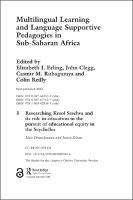Chapter 3 Researching Kreol Seselwa and its role in education in the pursuit of educational equity in the Seychelles
Proposal review
| dc.contributor.author | Deutschmann, Mats | |
| dc.contributor.author | Zelime, Justin | |
| dc.date.accessioned | 2021-11-10T12:44:32Z | |
| dc.date.available | 2021-11-10T12:44:32Z | |
| dc.date.issued | 2022 | |
| dc.identifier.uri | https://library.oapen.org/handle/20.500.12657/51401 | |
| dc.description.abstract | This edited collection provides unprecedented insight into the emerging field of multilingual education in Sub-Saharan Africa (SSA). Multilingual education is claimed to have many benefits, amongst which are that it can improve both content and language learning, especially for learners who may have low ability in the medium of instruction and are consequently struggling to learn. The book represents a range of Sub-Saharan school contexts and describes how multilingual strategies have been developed and implemented within them to support the learning of content and language. It looks at multilingual learning from several points of view, including ‘translanguaging’, or the use of multiple languages – and especially African languages – for learning and language-supportive pedagogy, or the implementation of a distinct pedagogy to support learners working through the medium of a second language.The book puts forward strategies for creating materials, classroom environments and teacher education programmes which support the use of all of a student’s languages to improve language and content learning. The contexts which the book describes are challenging, including low school resourcing, poverty and low literacy in the home, and school policy which militates against the use of African languages in school. The volume also draws on multilingual education approaches which have been successfully carried out in higher resource countries and lend themselves to being adapted for use in SSA. It shows how multilingual learning can bring about transformation in education and provides inspiration for how these strategies might spread and be further developed to improve learning in schools in SSA and beyond. | en_US |
| dc.language | English | en_US |
| dc.subject.classification | thema EDItEUR::J Society and Social Sciences::JN Education | en_US |
| dc.subject.classification | thema EDItEUR::J Society and Social Sciences::JN Education::JNU Teaching of a specific subject | en_US |
| dc.subject.other | educational attainment, Global South, language teacher education, linguistic culture, mother-tongue based education, Multilingual Africa, multilingual learning, multilingualism, Sub-Saharan Africa, translanguaging | en_US |
| dc.title | Chapter 3 Researching Kreol Seselwa and its role in education in the pursuit of educational equity in the Seychelles | en_US |
| dc.type | chapter | |
| oapen.identifier.doi | 10.4324/9781003028383-4 | en_US |
| oapen.relation.isPublishedBy | 7b3c7b10-5b1e-40b3-860e-c6dd5197f0bb | en_US |
| oapen.relation.isPartOfBook | fcdc3fa9-cee8-4c8f-a28d-9de19f03f454 | en_US |
| oapen.relation.isbn | 9780367677527 | en_US |
| oapen.relation.isbn | 9781003028383 | en_US |
| oapen.imprint | Routledge | en_US |
| oapen.pages | 19 | en_US |
| oapen.remark.public | Funder name: Örebro University, Sweden | |
| peerreview.anonymity | Single-anonymised | |
| peerreview.id | bc80075c-96cc-4740-a9f3-a234bc2598f1 | |
| peerreview.open.review | No | |
| peerreview.publish.responsibility | Publisher | |
| peerreview.review.stage | Pre-publication | |
| peerreview.review.type | Proposal | |
| peerreview.reviewer.type | Internal editor | |
| peerreview.reviewer.type | External peer reviewer | |
| peerreview.title | Proposal review | |
| oapen.review.comments | Taylor & Francis open access titles are reviewed as a minimum at proposal stage by at least two external peer reviewers and an internal editor (additional reviews may be sought and additional content reviewed as required). |

